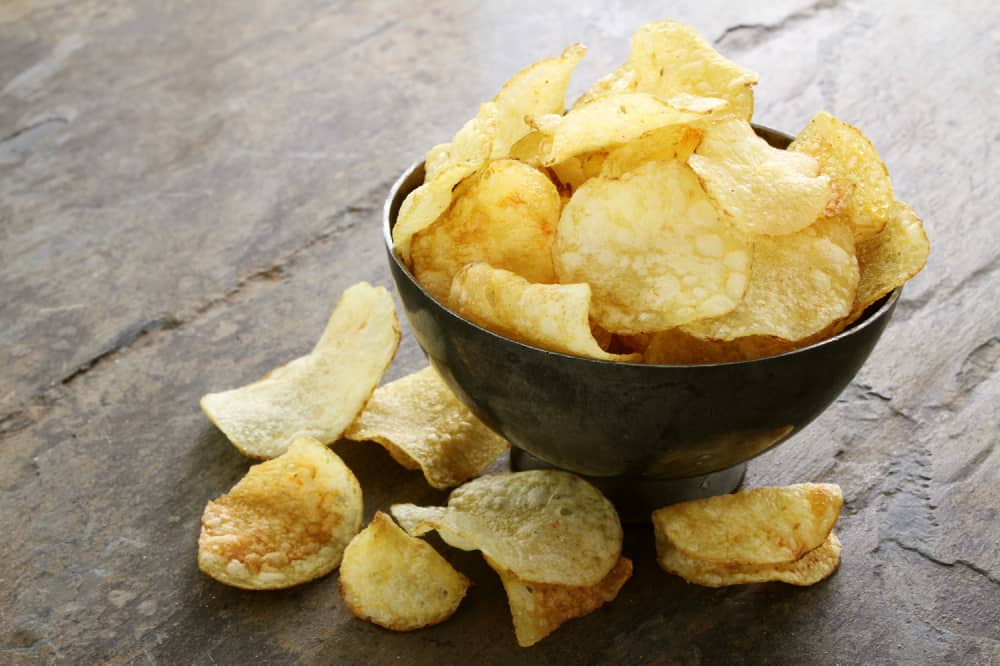
7 foods to avoid with atrial fibrillation
Atrial fibrillation is a health condition that disrupts the heart’s rhythm. This negatively affects the rhythmic pumping of the atria, or upper chambers, of one’s heart. People with this condition experience fast or irregular heart rates. This makes the heart less efficient in terms of circulation. As a result, it has to work doubly hard to pump blood to various parts of the body. There are certain foods that can worsen this condition.
These are foods that patients with atrial fibrillation should avoid:
- Potato chips
Certain food-based compounds can mess with the circulatory system and one’s cardiovascular health. Two such prominent components are partially hydrogenated vegetable oils and margarine. These are usually associated with deep-fried foods. Both of these components contain trans fats in high proportions and can dramatically increase the risk of atrial fibrillation in individuals. Apart from atrial fibrillation, these foods also increase the possibility of developing other cardiovascular ailments.Butter, red meat, and cheese are loaded with saturated fats, while margarine, cookies, potato chips, partially hydrogenated vegetable oils, doughnuts, certain cookies and crackers, and other deep-fried foods are filled with trans fats. Therefore, if one has a habit of tearing open a pack of potato chips and bingeing on them, they will need to let go of it to keep their heart healthy and away from atrial fibrillation.
-
Coffee
Caffeine is a harmful food ingredient if it is consumed in large quantities. In fact, the daily consumption of coffee or tea can put people in danger of developing atrial fibrillation in the long run. Many studies have found a direct link between cardiovascular deterioration and coffee drinking. Other caffeine-heavy foods besides coffee are tea, guarana, soda, and energy drinks.Coffee consumption, if regularly done (as is the case with most consumers), increases blood pressure, anxiety, depression, and insulin resistance in many individuals. On the other hand, coffee has some unexpected benefits, with contradicting research studies finding that it may also also have some positive effects on the heart. Just to be on the safe side, one can reduce their coffee consumption daily.
Caffeine-laced drinks are just as bad, if not worse, for people with cardiac-related health conditions. This is because such drinks contain chemical preservatives and other compounds that can seriously mess with one’s heart health. Caffeine is a major no-no for consumption if one needs to maintain good cardiovascular health.
-
Salt
Salt is an indispensable part of most people’s meals worldwide, but it is not the best food for avoiding atrial fibrillation in individuals. Salt contains sodium, which can cause cardiovascular issues if consumed regularly. Sodium causes a person’s blood pressure to rise dramatically. As a result, if one consumes salt regularly, they leave themselves exposed to problems such as high blood pressure and hypertension. -
Energy drinks
High-octane drinks contain not just one but two substances that can cause cardiovascular health deterioration in their frequent consumers. These are caffeine and refined sugars. The issues related to caffeine are well known by now, and sugar increases blood sugar levels in people and causes their insulin levels and other key metrics to destabilize. What’s more, sugar also causes inflammation, a problem that directly affects an individual’s cardiovascular health.The main value proposition of energy drinks is that it gives instant energy. These drinks’ high sugar and caffeine content help people achieve that objective. However, after the momentary high, people will experience an energy crash soon. The health-related issues caused by these drinks also linger in the consumers’ bodies. Due to these reasons, consuming water or freshly extracted natural fruit juices is always advisable over highly caffeinated and sugar-filled energy drinks.
-
Beef
As implied above, red meat is also dangerous for cardiovascular health. Red meat-rich foods like beef and pork are chock-full of saturated fats. These fats increase cholesterol levels in people and affect their circulation in various ways. For example, saturated fats tend to decrease the width and area of blood vessels, causing them to constrict. This results in large volumes of blood passing through thin lanes in blood vessels throughout the body. As a result, frequent beef or pork consumption causes blood pressure issues in people. -
Grapefruit
Grapefruit may seem pretty harmless, but it can lead to cardiovascular health issues. Multiple compounds in grapefruit are known to trigger the concentration of afib-enhancing elements in one’s blood to spike dramatically over some time. Under certain circumstances, grapefruit has been medically found to make one’s blood thinner, causing people to become vulnerable to frequent bleeds and loss of nutrients. Suppose an individual is already undergoing treatment and consumes prescription-based solutions for atrial fibrillation. In that case, consuming grapefruit can interfere with how their heart functions and the all-important organ’s beating rhythm.Like some other fruits, Grapefruit contains sugary elements and other components that make it a problematic food for people with high blood pressure and other cardiovascular issues. This is why healthcare experts advise their clients to reduce grapefruit consumption despite its numerous health and taste benefits.
-
Cakes and pastries
Cake and pastries contain sugar, a food almost universally known to cause health issues if consumed excessively. On top of that, these foods also contain worrying amounts of gluten, another food element that can be menacing for one’s heart health and rhythm. This is especially relevant for individuals with gluten insensitivity or allergies (or conditions such as the infamous celiac disease). If such individuals consume even a small quantity of gluten, their health can be severely affected. Therefore, healthcare experts ask their patients to avoid cakes and pastries.


